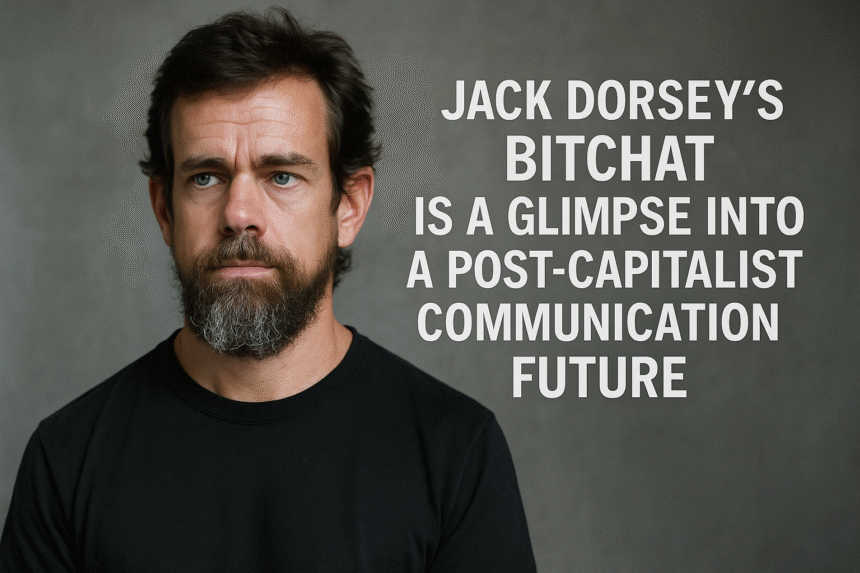In the digital age, messaging isn’t just communication—it’s commerce, data, identity, and power.
From Meta’s WhatsApp to Apple’s iMessage, from Signal’s nonprofit stance to Jack Dorsey’s Bitchat — the world of messaging has become a battleground of philosophies: profit vs. privacy, infrastructure vs. autonomy, growth vs. resilience.
But the question remains: Can we truly message freely if every message is monetized?
⚙️ The Tesla Analogy: When Ideals Meet Capital
In the early 1900s, Nikola Tesla dreamed of free wireless electricity for the world. But J.P. Morgan, his financier, pulled the plug with a cold truth: “If anyone can plug in, where do we put the meter?”
Today, most messaging apps are functioning Teslas—serving billions. But behind the screens lie “meters”: servers, analytics, and monetization models.
Let’s decode who’s charging what, and why the future may need uncapped wires — or wires altogether removed.
🧾 The Messaging Business Model Matrix
App
Owner
Monetization Model
Identity Model
Privacy Philosophy
Server Dependence
Meta (Facebook)
Free, but data mining, business API
Phone number
E2E encryption, but metadata is logged
Full server-side
iMessage
Apple
Freemium ecosystem driver
Apple ID
E2E encryption, closed ecosystem
Server-mediated
Telegram
Pavel Durov
Freemium + Ads + Premium tiers
Phone number
Claims privacy, stores chats on cloud
Centralized cloud
Signal
Signal Foundation
Donations & grants (nonprofit)
Phone number
E2E, open-source, strong stance on privacy
Centralized, self-hosted
Tencent (China)
Super app: Ads, payments, services
Phone number (China ID linked)
Low privacy, surveillance compliant
Government-monitored
Bitchat
Jack Dorsey / Open
No monetization yet — fully decentralized
Ephemeral Public Key
E2E, no metadata, no SIM, no server
Bluetooth mesh only
💰 Capitalization: How They Cash In
🔹 WhatsApp / Meta
Ad Revenue Funnel: WhatsApp feeds data to Meta’s ad engine. Business APIs: Companies pay to interact with users on WhatsApp. WhatsApp Pay: Slow rollout, but designed to control small payments in ecosystems like India and Brazil.
🔹 iMessage / Apple
Apple doesn’t sell iMessage — it sells iPhones. iMessage keeps users loyal to Apple’s ecosystem. Privacy is a product feature that boosts hardware sales.
🔹 Telegram
Telegram introduced sponsored messages and premium plans. It sits on a goldmine of public channels, user analytics, and global reach — but walks a thin line between ideology and sustainability.
🔹 Signal
A rare case — funded through donations, the Signal Foundation lives on grants from donors like WhatsApp’s founder Brian Acton. Refuses ads, data mining, or investor pressure.
🔹 Bitchat
No central server. No SIM cards. No ads. No data tracking. Not monetized at all. The closest comparison: Bitcoin’s early years. If future forks allow Bitcoin Lightning transfers, monetization may become user-to-user, not app-to-user.
🧠 But Can True Privacy Be Monetized?
Capitalism and surveillance go hand-in-hand in today’s tech ecosystem. As apps grow, so does investor pressure to:
Insert ads Capture behavioral data Monetize attention
Signal’s struggle for funding. Telegram’s shift toward ads. Even Apple’s pivot to AI-based data inference shows that messaging is under pressure to earn — and privacy becomes a premium, not a right.
“Every centralized service eventually answers to a boardroom, not a user.”
— Data Ethics Scholar, IISc Bengaluru
🌐 Enter Bitchat: A Tesla Moment for Messaging
Like Tesla’s wireless towers, Bitchat removes the infrastructure middleman:
No servers No numbers No data trails No platform to monetize
And that’s the point. It doesn’t want to earn from users. It wants users to own their communication.
Whether used by students during campus blackouts, journalists under surveillance, or communities in remote regions — Bitchat offers messaging that cannot be switched off, priced, or profiled.
🔮 The Road Ahead: Will the Market Allow It?
If enough people adopt serverless communication, Bitchat could create a new paradigm — where privacy is not a luxury, and messaging is truly free. But this won’t happen in a year. Infrastructure-free networks need density, trust, and vision — the same way Bitcoin needed belief.
The irony? If Bitchat grows too fast, someone will eventually ask:
“Where do we put the meter?”
📌 Conclusion
Today’s messaging landscape mirrors a larger battle:
Freedom vs. monetization. Privacy vs. platform control. Tesla vs. Morgan.
And while most messaging apps charge you one way or another —
Bitchat, like Bitcoin, offers a glimpse into a future uncoupled from infrastructure and intermediaries.
It may not make money. But it may make a movement.

